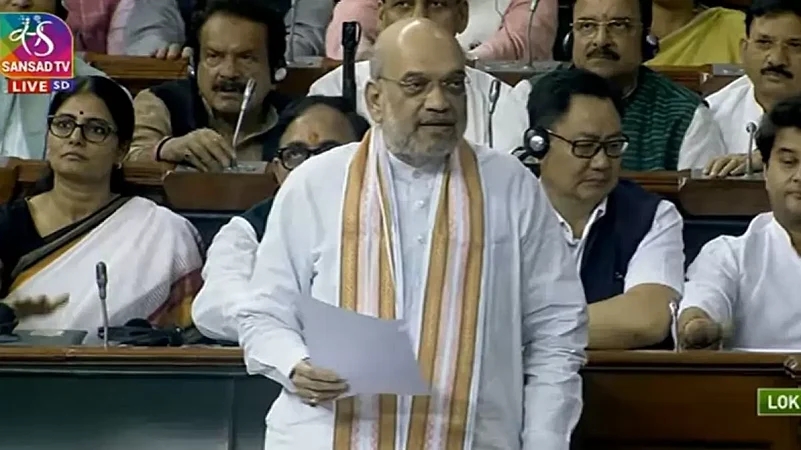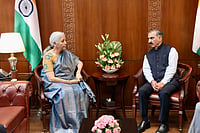Union Home Minister Amit Shah on Monday said the three bills introduced in Parliament by the Centre to replace the IPC, CrPC, and Evidence Act will ensure no case can continue for more than two years, which will result in the elimination of "70 per cent negative energy".
Shah was chairing the 26th Western Zonal Council meeting held in which a total of 17 issues between the states and Centre were discussed, nine of which were resolved, while the rest were kept for monitoring after in-depth discussion, a government release said.
The Western Zonal Council comprises Gujarat, Maharashtra, Goa, and the Union Territories of Daman and Diu and Dadra and Nagar Haveli. The meeting was attended by Gujarat Chief Minister Bhupendra Patel, Maharashtra CM Eknath Shinde, Goa CM Pramod Sawant and Administrator of Dadra & Nagar Haveli and Daman & Diu Prafful Patel.
It was also attended by Maharashtra Deputy Chief Minister Devendra Fadnavis and other ministers, chief secretaries from the states in the Western Zone, the Union Home Secretary, Secretary, Inter-State Council Secretariat, and other senior officials.
"After the passage of the three new Bills - Bhartiya Nyaya Sanhita Bill 2023, Bharatiya Nagrik Suraksha Sanhita Bill 2023, and Bharatiya Sakshya Bill 2023 - recently introduced by the Modi government in Parliament, no case can continue for more than two years, which will result in the elimination of 70 per cent negative energy," Shah said in his address.
"All states should work towards creating necessary basic infrastructure and capacity for the implementation of these laws," Shah said.
The BJP-led Centre introduced these three new bills in the Monsoon session of Parliament to replace the Indian Penal Code (IPC), Code of Criminal Procedure (CrPC), and Indian Evidence Act.
"The Western Zone is an important zone of the country and with a contribution of 25 per cent to the country's GDP, this region is the hub of finance, IT, diamond, petroleum, automobile, and defence," Shah said.
States in the Western Zonal Council share long coastlines dotted with highly sensitive institutions and industries and there was a need for sustained efforts towards ensuring tight security, the Union Home minister said.
Some crucial issues discussed were 'transfer of land-related issues, issues related to water supply, operationalization of auctioned mines, cash deposit facility at Common Service Centre, coverage of villages by bank branches/Postal Banking facilities, speedy investigation of cases of sexual offence/rape against women and children, implementation of the scheme of Fast Track Special Courts (FTSCs) for expeditious disposal of rape and POCSO Act cases, the release said.
Shah said Zonal Councils provide the opportunity for personal interaction at the highest level amongst the members and serve as a useful forum for resolving issues of a difficult and complex nature in an atmosphere of amity and goodwill.
Through discussion and exchange of views, the Zonal Councils help in developing a coordinated approach among the states on important issues of socio and economic development, he asserted.
Shah asked Zonal Council member states to work sensitively on three issues of national importance, namely 'POSHAN Abhiyaan', reducing the dropout rate of school children, and taking benefits of Ayushman Bharat – Pradhan Mantri Jan Arogya Yojana to the poor.
"After the recent success of the country's Chandrayaan mission, the whole world is praising the Indian Space Research Organization (ISRO). In the last nine years, with his foresight, Prime Minister Narendra Modi has not only given a new direction to India's space sector but has made a time-bound program and framework to take the country to the forefront of the world in the field of space by 2030," he said.
On the occasion, Shah inaugurated an e-resource web portal to facilitate the functioning of Zonal Councils.
The portal is a repository of important documents, including minutes and agenda of various meetings of the Inter-State Council as well as its Standing Committee since its constitution on May 28, 1990, and Zonal Councils and their Standing Committees since they were formed in 1957, the release informed.
Three Bills To Replace IPC, CrPC, Evidence Act Will Eliminate 70 Pc Negative Energy, Says Amit Shah
Home Minister Amit Shah said on Monday that the three bills to replace the IPC, CrPC, and Evidence Act introduced in Parliament would prevent cases from lingering beyond two years, eliminating "70 percent negative energy".

Union Home Minister Amit Shah
Union Home Minister Amit Shah
Published At:
MOST POPULAR
WATCH
MORE FROM THE AUTHOR
PHOTOS
×





















